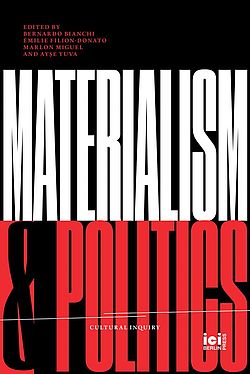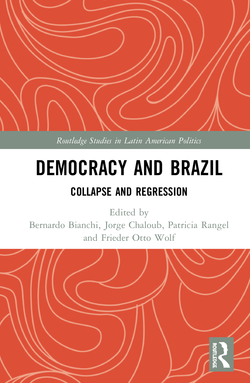Bernardo Bianchi | Chercheur Fellow

Discipline
:
Philosophie
,
Science Politique
|
Biographie
Bernardo Bianchi est visiting professor à l'Universidade de São Paulo (Departement de Philosophie-FFLCH). Il était avant chercheur postdoctoral de la Fondation Alexander von Humboldt (AvH) et de la Coordination pour le Perfectionnement du Personnel de l'Enseignement Supérieur du gouvernement brésilien (CAPES) à la Goethe-Universität Frankfurt am Main aussi bien que à la Freie Universität Berlin (FU-Berlin), où il a enseigné au Département de Philosophie en tant que chercheur invité. Il est titulaire d'un doctorat (cotutelle) en Sciences Politiques (Université de l'État de Rio de Janeiro, IESP-UERJ) et Philosophie (Université Paris 1, Panthéon-Sorbonne) obtenu en 2015.
Bourse
Doctorat (2009-2016)
- CNPq (Conseil National de Développement Scientifique et Technologique du Gouvernement Brésilien) et FAPERJ (Fondation Carlos Filho pour le Soutien de la Recherche dans l'État de Rio de Janeiro)
Postdoc (2016-)
- AvH (Alexander von Humboldt Stiftung)
Sujet de recherche
Les principaux champs de recherche de Bernardo sont la philosophie politique, l'histoire de la philosophie, la théorie politique contemporaine, ainsi que la théorie sociale. Sa thèse de doctorat porte sur l'étude de l'idée de transformation chez Spinoza et Marx.
Titre de la thèse
Le fil rouge de la transformation : Marx et SpinozaRésumé de la thèse
Ces dernières décennies, la relation entre Spinoza et Marx a été abordée par des auteurs comme Louis Althusser, Antonio Negri et Maximilien Rubel. Néanmoins, bien que l'on puisse établir un lien entre les deux au niveau des affinités théoriques, il manque une analyse du rapport entre ces affinités et les références effectives que Marx fait à Spinoza. Nous ne savons pas davantage, jusqu'à maintenant, comment ces références s'articulent avec les objectifs du militantisme philosophique et politique que Marx s'est fixé tout au long de sa vie. La présente étude cherche donc à parcourir les premières oeuvres de Marx de manière à y étudier la présence de Spinoza, et à démontrer simultanément à quels buts cette présence était subordonnée. Parallèlement, et de façon tout aussi importante, il s'agit de montrer que, bien que ces usages font apparaître la façon dont Marx s'est éloigné de Spinoza, ils n'en révèlent pas moins que, dans cet éloignement, Marx finit par retrouver, non pas tant Spinoza, mais le spinozisme
Directeur de thèse
Projets
Dans le cadre de son travail postdoctoral, Bernardo Bianchi développe une recherche sur l'émancipation, qui porte à la fois sur une analyse historique et une approche normative de cette problématique. A partir d’une confrontation avec le concept de « révolution », il s’agit d’analyser la question de l’« émancipation », de manière à démontrer que ce mot est inséparable d'une certaine polysémie, sans jamais se cristalliser en un sens déterminé en ce qui concerne le devenir actif de la multitude.
Repolitiser la connaissance
Paradoxes de L'émancipation
Mitglieder: Jorge Chaloub (UFRJ), Bruna Coelho (CMB), Maria Luiza Cracel (USP), Thiago Dias (USP), Katia Genel (CMB/Paris 1), Edward Guetti (CMB/American University), Bénédicte Laumond (CMB/Université de Versailles), Benito Maeso (USP/UFPR), Maria Fernanda Novo (USP), Luís César Oliva (USP), Marianna Poyares (The New School), Homero Santiago (USP), Mariana Simoni (CMB/FU Berlin), Jefferson Viel (USP/UFU), Ayşe Yuva (CMB/Paris 1)
Materialism and Politics
02 mars 2021Ayse Yuva , Bernardo Bianchi , Emilie Filion-Donato, Marlon Miguel
Collection: Cultural Inquiry
ISBN: 978-3-96558-018-3
What remains of materialism’s subversive potential — i.e., its ties with heresy or atheism and republicanism or communism — and to what extent does this concept still interpellate us politically and philosophically?
As neoliberal policies expanded far beyond the state, their mechanisms of control seeped into the materiality of social reproduction, solidifying a conception of matter as something inert, to be appropriated, manipulated, and exploited. If in this context the subversive nature of a reference to materiality is called into question, it has also provoked new forms of resistance, as well as fundamental reconsiderations of the political implications of the notion of ‘matter’.
Against this background, the aim of this book is to show the diversity within continued engagements with materialism as a central concept for progressive politics, be it in the direction opened up by New Materialism, in renewed forms of Marxist and Spinozist based approaches, or in feminist analyses, each in their own terms, without excluding the possibility of alliances between them.
Finally, this volume insists that the study of materiality and materialist approaches does not amount to a renunciation of philosophy, but rather urges us to broaden the task of philosophical thought in order to reconsider the historical and, in every sense of the word, material situatedness of all philosophical problems. Against a reductive and ahistorical conception of materialism — the straightest way back to ideology —, this book offers an analysis of its diverse emancipatory potentialities.
Democracy and Brazil. Collapse and Regression
23 septembre 2020Bernardo Bianchi , Jorge Chaloub, Patricia Rangel, Frieder Otto Wolf
Routledge Studies in Latin American Politics
Edition: Routledge
Collection: Routledge Studies in Latin American Politics
ISBN: 9780367897680
Democracy and Brazil: Collapse and Regression discusses the de-democratization process underway in contemporary Brazil.
The relative political stability that characterized domestic politics in the 2000s ended with the sudden emergence of a series of massive protests in 2013, followed by the controversial impeachment of Dilma Rousseff in 2016 and the election of Jair Bolsonaro in 2018. In this new, more conservative period in Brazilian politics, a series of institutional reforms deepened the distance between citizens and representatives. Brazil's current political crisis cannot be understood without reference to the continual growth of right-wing and ultra-right discourse, on the one hand, and to the neoliberal ideology that pervades the minds of large parts of the Brazilian elite, on the other. Twenty experts on Brazil across different fields discuss the ongoing political turmoil in the light of distinct problems: geopolitics, gender, religion, media, indigenous populations, right-wing strategies, and new forms of coup, among others. Updated analyses enriched with historical perspective help to illuminate the intricate issues that will determine the country's fate in years to come.
Democracy and Brazil: Collapse and Regression will interest students and scholars of Brazilian Politics and History, Latin America, and the broader field of democracy studies.
Publications
Past 5 years
A) Publications with peer review process
1. Bianchi, B. (2017) "Les affinités aléatoires: une contribution à l’étude du rapport Spinoza-Marx" (Aleatory Affinities: A Contribution to the Study of the Spinoza-Marx Relationship). In: Asterion: philosophie, histoire des idées, pensée politique (Lyon), V. 16.
2. Bianchi, B. (2015) "Revolução: da anakyklosis à utopia liberal de Sieyès" (Revolution: from anakyklosis to the liberal utopia of Sieyès). In: Lua Nova (São Paulo), V. 97.
3. Bianchi, B. (2015) "Vauvenargues: un moralista sedicioso" (Vauvenargues: a seditious moralist). In: Revista Ingenium (Madrid), V. 9, P. 51-74.
4. Bianchi, B. (2014) "As astúcias da cumplicidade: da suposta influência de Spinoza sobre Marx" (The cunnings of complicity: Spinoza and Marx). In: Cadernos Espinosanos (São Paulo), V. 30, P. 75-93.
5. Bianchi, B. (2013) "Filosofias para a segunda natureza: estratégias do finito em Vauvenargues" (Philosophies for the second nature: strategies of finite). In: Revista de Estudos Políticos (Rio de Janeiro), V. 7 (2013/2), P. 86-107
A.1) Publications accepted but not yet published::
6. Bianchi, B. (2018) "Marx’s reading of Spinoza: on the alleged influence of Spinoza on Marx". In: Historical Materialism (London).
B) Publications without peer review process
7. Bianchi, B. (2017) "Dois conceitos de emancipação" (Two concepts of emancipation). In: Ao Largo (Rio de Janeiro), V. 4, P. 42-55.

